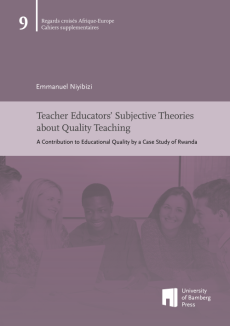Emmanuel Niyibizi
Teacher Educators’ Subjective Theories about Quality Teaching
A Contribution to Educational Quality by a Case Study of Rwanda
Reihe: Regards croisés Afrique-Europe. Cahiers supplementairesThis study focuses on exploring subjective theories of teacher educators about quality teaching in the context of their profession in Rwanda. It is based on determinant role of subjective theories in educational quality improvement. Additionally, teacher educators are the driving forces due to their role in the initial and continuous teacher education. However, empirical research on teacher educators’ subjective theories is very limited in the Global South including Rwanda. Due to the exploratory nature this study, a qualitative approach using semi-structured interviews was used to collect data from 32 teacher educators theoretically sampled. Using content analysis, iterative deductive-inductive process as well as the generalisation of results through abduction, the results show that interviewed teacher educators have four ideal types of subjective theories. They include subjective theories focusing on: formalities by compliance (following pedagogical and administrative formalities); knowledge by transmission (transmission of immutably prescribed knowledge); behaviour by imitation (learning by imitation) and competences by co-construction (development of competences through active, interactive and reflective approaches). The generated typology enlightens research, policy and practice regarding quality teaching and teacher education in Rwanda and possibly similar contexts.

